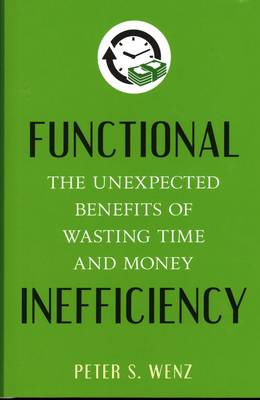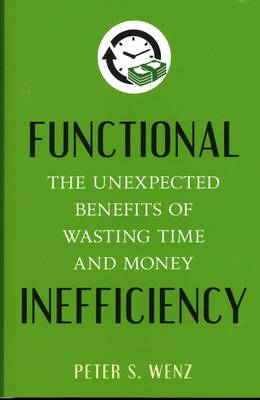
- Afhalen na 1 uur in een winkel met voorraad
- Gratis thuislevering in België vanaf € 30
- Ruim aanbod met 7 miljoen producten
- Afhalen na 1 uur in een winkel met voorraad
- Gratis thuislevering in België vanaf € 30
- Ruim aanbod met 7 miljoen producten
Zoeken
Functional Inefficiency
The Unexpected Benefits of Wasting Time and Money
Peter S Wenz
Hardcover | Engels
€ 38,45
+ 76 punten
Omschrijving
How can we reduce unemployment? As this insightful and counterintuitive book shows, the surprising answer is inefficiency. Some of the most labor-intensive sectors of the economy, the author notes, are also the most inefficient. But this inefficiency is functional--rather than impairing the economy, it bolsters employment and fosters economic growth.Technological progress increases efficiency and reduces the need for workers in manufacturing, mining, agriculture, and many services. So how do we keep people working? By maintaining inefficiencies in other areas, such as in our systems of transportation and healthcare. The author documents the waste of time and money in hospital systems, the insurance and pharmaceutical industries, automotive travel, road construction, and road maintenance. These inefficiencies are tolerated because they provide a lot of jobs and promote economic growth, making them functional inefficiencies.Most of these inefficiencies can be reduced without increasing unemployment or impairing economic growth, the author claims, through increased investment in physical and human infrastructure. However, continued inefficiencies inherent in consumerism can't be eradicated without economic decline, making some inefficiency essential as well as functional.Functional Inefficiency offers a wealth of details and a unique analysis of our economic system, plus hope for our future prospects through reduced inefficiency.
Specificaties
Betrokkenen
- Auteur(s):
- Uitgeverij:
Inhoud
- Aantal bladzijden:
- 444
- Taal:
- Engels
Eigenschappen
- Productcode (EAN):
- 9781633880405
- Verschijningsdatum:
- 9/06/2015
- Uitvoering:
- Hardcover
- Formaat:
- Genaaid
- Afmetingen:
- 155 mm x 231 mm
- Gewicht:
- 680 g

Alleen bij Standaard Boekhandel
+ 76 punten op je klantenkaart van Standaard Boekhandel
Beoordelingen
We publiceren alleen reviews die voldoen aan de voorwaarden voor reviews. Bekijk onze voorwaarden voor reviews.








